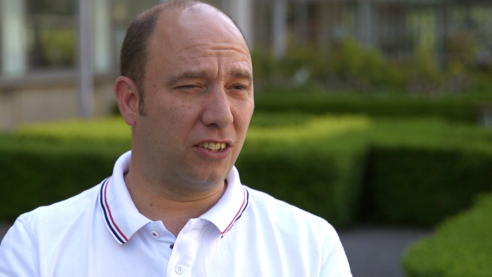 Much (perhaps most) of what people learn is through interaction with other people, especially, but not only, those who know more about a topic than they do. This happens from the beginning of a person’s life. It is a natural instinct for babies to want to find out more about the world from their parents or other people they encounter. From the start of their lives most babies will try to communicate by various means such as crying and making gestures and sounds. Over the next few years they will learn to speak in order to learn. Most people around them will help them develop speaking skills by talking to them and encouraging them as they try to express themselves.
Much (perhaps most) of what people learn is through interaction with other people, especially, but not only, those who know more about a topic than they do. This happens from the beginning of a person’s life. It is a natural instinct for babies to want to find out more about the world from their parents or other people they encounter. From the start of their lives most babies will try to communicate by various means such as crying and making gestures and sounds. Over the next few years they will learn to speak in order to learn. Most people around them will help them develop speaking skills by talking to them and encouraging them as they try to express themselves.
These young children do not simply copy what they have heard. For example, children may make up words for concepts they have not yet heard the word for. Later they are likely to encounter the appropriate words. As they develop their knowledge of a language, children also use this language to learn about the world.
In formal educational contexts, spoken interaction is also vitally important for learning. Learners speak to their teachers and to their peers. Amongst the kinds of things that pupils need to do in a spoken form in class are:
- Understand or get clarification
- Ask and answer questions
- Make suggestions
- Explain reasons.
Understanding and asking for clarification
A great deal of learning is done through listening to a teacher or other students. This provides two challenges for learners.
- They either need to fully understand or
- They need to be able to ask questions to understand.
Lack of understanding could be the result of two factors. It could be that the learner has not understood the idea or it could be due to a lack of understanding the language used to express the idea.
In both cases, the learner could ask for clarification. This is important if they are going to be able to study effectively. However, they need to be polite as well as informative. For example, they could say something like:
“I am afraid I don’t understand what you mean. Can you explain it again?”
“Excuse me, what does this word mean?”
However, the explanations might be too complicated and asking for examples can be a good strategy for speakers to clarify.
Sometimes people think they understand but are not sure. In this case, they might want confirmation and could say something like “Do you mean …?” or “Does this mean..?"
Teachers do not just explain. They also ask the learners questions and answering questions is another skill they need. It is appropriate to answer questions in short forms with just a word or short phrase as in the example below:
“What is the square root of 144?”
“12”.
Learners also need to be able to show whether they are confident of their response or whether they are certain. A falling tone will tend to indicate certainty whereas a rising one may indicate less confidence.
Many classes now also involve group work so learners need to be able to communicate effectively with each other when speaking. Group work can provide practice and good learning experiences but only if learners are able to explore ideas constructively. This involves the following:
- Starting and finishing discussions
- Keeping the discussion relevant
- Taking and giving turns
- Putting forward and explaining points of view
- Exploring the views of others.
Starting a discussion requires confidence and an ability to be heard over other members of the group. Confidence is built up through language skills and an ability to focus on the task and these are also very important in keeping a discussion relevant.
Knowing when to speak is an important skill. This involves, for example, listening for when other people pause (and they are likely also to show they have finished through a falling or possibly a rising tone that becomes fainter).
Learning in groups requires exploratory talk. This means that the people discussing should try to find agreement but this agreement should be on the basis of explaining and questioning critically each others’ ideas. For example, learners might solve a problem by discussing it and this could involve such functions as suggestions (what about..?) questioning suggested solutions (How would that work?), raising other possibilities or combing suggestions (Why don’t we partly do … and also..?).
Learners may also be asked to give spoken presentations. This is easier in some ways than group discussion but is more difficult in others. It is easier in that students do not have to worry about getting turns. However, presentations put a much greater responsibility on the presenter in terms of keeping relevant and making themselves clear. A very clear structure is important and learners need to make use of preparation time. Intonation also plays a very important role here with a falling tone showing that a point has been finished and a rising tone showing that it has not.
Speaking is also important in many distance learning contexts. For example, distance students might be expected to speak in the following situation:
- Face to face tutorials
- Online tutorials
- One to one conversations (eg phone calls)
Online tutorials might be challenging in that there is little use of body language and sometimes the sound quality can be less than perfect. However, a student in an online tutorial can often post written messages or use an icon to ask someone to repeat or explain in more detail[PA1] .
Talking one to one can be quite intense and challenging. However, tutors should be sympathetic and students should be able to
How students can improve their English speaking skills
There are a wide variety of ways students can help themselves to be effective speakers. Some of these are listed below:
- Practising speaking skills as much as possible. This does not need to be with someone who speaks English as their first language as many people who speak other languages study through English or use it in their work
- Preparing for speaking situations as much as possible (eg make sure that they have read the relevant material
- Being as confident as possible when asking for clarification.



Rate and Review
Rate this article
Review this article
Log into OpenLearn to leave reviews and join in the conversation.
Article reviews